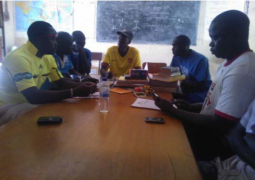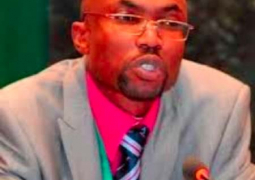The President of the Federation of African Journalists and Secretary General of the Eastern Africa Journalists Association has opined that journalists and media workers continue to be the subject of most dangerous and violent attacks, including killings, physical violence and administrative harassment.
Omar Farouk Osman, a Somali, was speaking to regional delegates, representatives of NGOs, and human rights activists on Friday as part of the 49th Ordinary Session of the African Commission on Human and Peoples’ Rights under way at the Kairaba Beach Hotel.
He drew the African Commission’s attention to what he described as the appalling climate of insecurity faced by journalists across the African continent.
According to him, it is disheartening to observe that government and non-state actors deliberately commit crimes against journalists with total impunity a situation, which he said, is exacerbated in conflict zones.
“In many countries, legal restrictions such as overbroad national security and defamation provisions, tax and administrative measures are constantly used to silence and threaten critical voices. Journalists who investigate corruption and other sensitive issues are generally intimidated by governments, physically attacked by security forces, militia and other non-state actors,” he added.
He noted that despite a recommendation of the African Commission calling on member states to review their national laws to conform with the declaration of the principles on freedom of expression, many governments continue to use harsh defamation laws to protect public figures and their allies.
Farouk revealed that few countries across the continent have reviewed their laws to decriminalize defamation, adding that in most countries inappropriate laws on false news are still used to stifle press freedom.
“Besides that abuse of legal provisions, safety and security of journalists and media workers on the continent has increasingly deteriorated due to targeted killings in conflict zones, detention centers and by organized crime,” he said.
Giving his account of events in his native
In
In The Gambia, Farouk noted that despite the recent talks between journalists and the government, the tension and climate of fear still hunts journalists.
He commended the South African government for its efforts to make consultations with journalists and the media community regarding the proposed Security Bill and the media appeal tribunal.
In his view, the violence and threats against journalists and media workers is exacerbated by the lack of adequate protection at national level, and the rooted impunity that perpetrators continue to enjoy across the continent.
He urged the African Commission to give priority to the protection and safety of journalists, particularly in armed conflicts, while calling on member states of the African Union to put in place adequate mechanisms and conduct transparent and independent investigations to bring perpetrators to book, and compensate victims.
He also called on the African Commission to adopt resolutions on safety and security of journalists in



